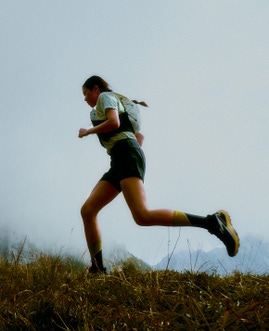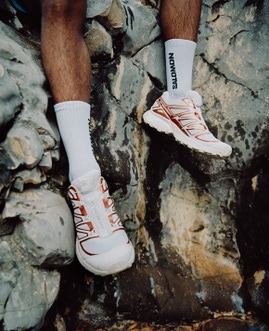By Meg Mackenzie
Salomon international trail running athlete and running coach
Getting back to training after time off from running depends on so many complex and interlinking components—how long you’ve been an athlete, your injury history, your age, what equipment you’ve had available to you during the lockdown as well as the natural genetic functioning of your body. In general, if you’ve had time off from running it’s advisable to take things slow. I’m pretty sure you’re all thinking “pssshhh easier said than done,” so here are some things to keep in mind as you begin your post lockdown training block.
You may be fit but you need gradual conditioning
Even if you’ve had time on an indoor trainer and are feeling fit, your tendons, ligaments, and bones need time to adapt to the high impact of running and the load you will be placing on them again. In fact, those who had had access to any kind of non-impact equipment like an elliptical machine or cycling trainer will have to work even harder at reigning yourself in when you start running again. You may feel superhuman after six weeks of cycling every day, but you’ll still require conditioning. First, biking or elliptical work are low impact and, secondly, they train different muscle patterns than running. Switching immediately and suddenly to only running because you feel fit is probably going to be a recipe for injury. Phase it in slowly, perhaps alternating days for the first week and then keeping mileage low but frequent in the second week. Stay in tune with your body and don’t let your mind tell you tricks on how much you NEED to do. Instead, focus on how much you CAN do.
Whatever ‘at-home’ workout you’ve been following will have an impact on your running
There have been loads of ‘at home’ workouts flooding our screens for weeks. Depending on which one you’ve been doing will also have a difference on how you get back to running. If you’ve been doing things that are totally different than your previous routine (maybe you started yoga for the first time or did some HIIT burpee challenges), you may find that things feel different than before when you start running. Remember that your body works in muscle patterns and your brain remembers those, so whichever exercises you’ve chosen will have had an effect on your body. There is no evidence of any strength work or intensity training having direct transfer into running. Give yourself grace if you feel like an awkward giraffe on those first few runs. Take things slow and add in 3-4 x 20-second moderate hill strides once or twice a week.

Stress is both mental and physical
These weeks and months have been a stressful period. Remember that your body processes all stress the same—physical, emotional, mental, etc. So If you’ve had a tough time due to the health crisis, going out and putting more physical stress on your body through running hard is going to lead to illness, injury or burnout. Listen to your body, take your previous ‘easy’ pace and make it easier for a week or two. Re-frame your runs so that you feel rejuvenated and fresh afterward rather than them adding stress to your system in any way.
Don’t Panic
It’s normal to have a panicky feeling when you feel like you’ve gone back to ‘square zero’ after a layoff from running. You miss being able to run fast, feel strong and go far. You want it back, and you want it now! This approach is not going to work and could lead to prolonged frustration. Quiet your mind and try not to compare yourself to others. In fact, I would advise taking a break from Strava or any other social media platforms that may be detrimental to your progress. Stick to your process and what your body can do given the circumstances and follow that. Comparison is the thief of all joy!
Process, process, process!
Goals are great, but right now the world is so upside down we may not have goals (like races) for quite some time. Instead of being disappointed by this, try to learn how to TRULY enjoy the process of running, gaining athleticism, and getting stronger. Set your intention for each and every run. That could be clearing your mind, rejuvenating, being kind to yourself, or increasing your capacity to maintain focus on the breath. Goals are awesome and fun, but the process is what makes us better people and athletes. Use this time to be kinder to yourself than ever before and don’t get swept up in the craziness of who’s doing what mileage at what pace. None of that matters. What matters is that you have fun, maintain health, and build consistency over time. If you are struggling to either hold yourself back or hold yourself accountable, sign up with a coach to help you maintain that objective of taking a more high-level, long-term perspective during this time.
Photo credits © : Philip Reiter & Martina Valmassoi













